Executive Summary
On September 23, 2001, then-U.S. President George W. Bush signed Executive Order (EO) 13224, which “authorizes the U.S. government to block the assets of individuals and entities that provide support, services, or assistance to, or otherwise associate with, terrorists and terrorist organizations designated under the Order, as well as their subsidiaries, front organizations, agents, and associates.”* This EO covers support for Lebanese Hezbollah and Gaza-based Hamas* and there remains considerable interest within the U.S. government to disrupt those groups’ financial networks as is evident from recent designations.*
Both Hezbollah and Hamas are Iranian-sponsored,* internationally sanctioned terrorist groups that have killed hundreds of Israeli citizens as well as Americans.* The two organizations depend on a variety of sources of funding, including revenues from illicit activities and charitable donations, to finance their operations. This report documents how Yemen’s Houthi rebels provided financial support to Hezbollah and Hamas as well as which Yemeni government officials, corporations, and private individuals were involved in this undertaking.
In 2021, the Houthis launched a fundraiser called “Jerusalem is Next” that collected money from Yemeni donors to support “Palestinian resistance,” including apparently Hamas. The campaign amassed approximately $4 million of contributions which were deposited via the Yemen Post banking system or the cellular provider Yemen Mobile. Al-Masirah, the Houthis’ premier media outlet, also ran TV advertisements to promote the effort.
Two years prior, in 2019, the Houthi-run Radio Sam FM launched a grassroots fundraiser to support Hezbollah. At the conclusion of the campaign, Sam FM released a document stating that it collected an amount equal to hundreds of thousands of U.S. dollars to be gifted to Hezbollah Secretary-General Hassan Nasrallah. One of the Sam FM employees leading the campaign, Hamoud Mohammad Sharaf, previously worked at Al Manar, which is currently sanctioned for fundraising for Hezbollah. The fundraiser also utilized the Yemen Post banking system to collect funds from Yemeni donors.
Hamas
2021 Fundraiser for Hamas
During the May 2021 clashes between Israel and Hamas/Palestinian Islamic Jihad (PIJ) in Gaza, the Houthis launched a public fundraiser to allegedly “support Palestine.” This effort was promoted by Houthi officials and media outlets alike.*
In an advertisement posted to Twitter by the Houthi Minister of Telecommunication and Information Technology, the Yemeni public was encouraged to donate to the cause by either depositing funds into account #1140 at the Yemen Post banking system or calling/texting the phone number 1140.
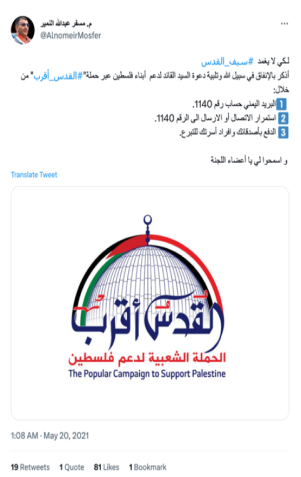
Translation: “So that the sword of Jerusalem is not sheathed, I remind you to spend in the way of God and to respond to the call of the Leader [Abdulmalik al-Houthi] to support the people of Palestine through the “#Jerusalem_is_next” campaign by: 1) ️Yemeni Post Account No. 1140. 2️) Continue calling or sending to the [telephone] number 1140. 3) Push your friends and family members to donate. Allow me [to thank you], members of the committee.”
The total amount raised through this campaign, according to the Houthi Zakat Authority, was around $4 million or slightly above 1 billion Yemeni Rials (YER) based on the 2021 exchange rate.*
That the beneficiaries of this fundraising effort included Hamas is based on evidence beyond the campaign’s suggestive phrasing that funds are collected to support “the Palestinian resistance.”*
Firstly, in an animated advertisement for the fundraiser aired on the Houthi-run Al-Masirah TV channel,* Yemeni rials are depicted as dropping into a charity collection box that is connected to an identifiable Hamas rocket which is then fired on an Israeli bunker. The Qassam rocket with the Hamas insignia (see below) indicates to the Yemeni public that their donations are in support of Hamas.
Second, editor Ebrahim al-Wadi from Al-Masirah posted a tweet saying that money raised by this campaign was provided to Hamas and PIJ in an official ceremony on May 12.* According to Wadi’s tweet, the amount raised at that early point in the fundraising campaign was 70 million YER (or approximately $280,000).
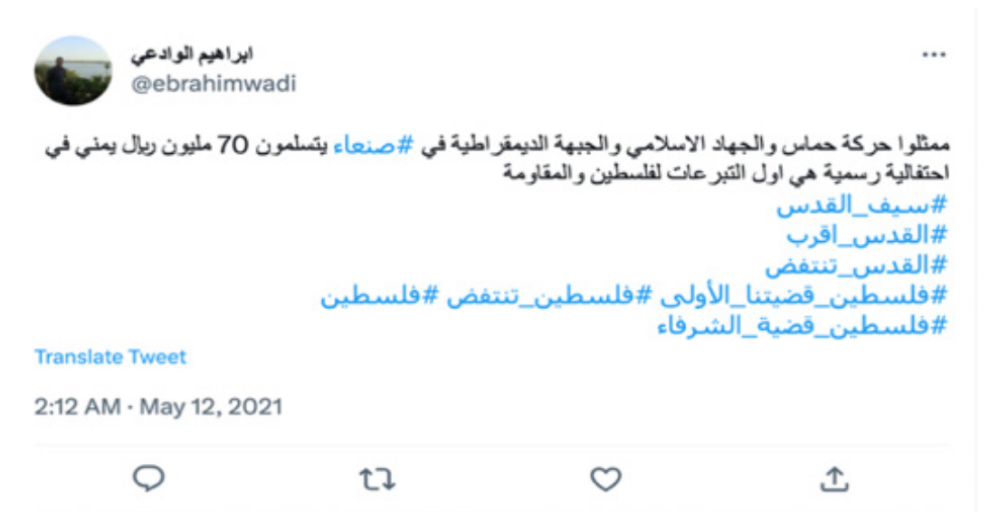
Translation: “In Sanaa, Representatives from Hamas, Islamic Jihad, and the Democratic Front [for the Liberation of Palestine] receive 70 million YER in an official ceremony, which are the initial donations to Palestine and the resistance #Sword of Al-Quds #Jerusalem is next #Jerusalem revolts #Palestine is our main cause #Palestine revolts #Palestine #Palestine is the matter of the honorable.”
At a fundraising event for this cause organized by the Houthi Zakat Authorities several weeks later, Houthi media noted official representatives from Hamas and PIJ were present.*
Third, on June 7, 2021, Hamas representative in Yemen Moaz Abu Shamala met publicly with senior Houthi official Mohammad Ali al-Houthi. According to the Sana’a Center for Strategic Studies, Abu Shamala “gave senior Houthi leader Mohammad Ali al-Houthi a gift of appreciation for launching a fundraising campaign to support the group amid Israel’s recent military campaign in Gaza.”* The Hamas representative noted during the meeting, which took place one month after the fundraiser’s launch, “We appreciate the initiatives launched by the Leader of the Revolution, and the Yemeni people’s actions to support the Palestinian people and the Palestinian cause.”
Hamas representative in Yemen Moaz Abu Shamala (second from left) meets with senior Houthi official Mohammad Ali al-Houthi (center) on June 7, 2021. Abu Shamala is presenting al-Houthi with a plaque from Hamas to express his appreciation for the fundraiser to benefit the Gaza-based group.
Hassan al-Hamran is the Houthi official responsible for the Palestinian file and, in his own words, involved in orchestrating cooperation with Palestinian “resistance” organizations.* He does this both in his capacity as a government official as well as his role leading a dubious Sanaa-based NGO entitled “Yemen Palestine Organization For Development And Humanitarian Response.”* Given his open ties with Hamas and PIJ* and his attendance of events promoting the terror fundraiser,* it is likely that al-Hamran is linked to Houthi cooperation with and support for Palestinian terror groups.
Entities Associated with the Houthi Fundraising Campaign for Hamas
Yemen Mobile
Yemen Mobile,* the country’s largest mobile network operator (MNO), was both a financial channel for and a contributor to the Hamas fundraiser.Yemen Mobile was founded by the government of Yemen in 2004, and it has remained majority owned and controlled by the Public Telecom Corporation which is a component of the Ministry of Telecommunication and Information Technology (MTIT). After the Houthis overthrew the internationally recognized government and seized power in Sanaa in 2014-2015, they began to use telecommunications companies based there (including Yemen Mobile) as tools to advance their territorial ambitions. Several sources have documented the Houthi tactic of compelling MNOs to cut off cell coverage to particular areas for days or weeks ahead of an invasion as a means to sow panic, confusion, and rumors, demoralizing local resistance prior to their onslaught*. Of course, after the areas fall under Houthi control, cellular service would resume.
In January 2018, the Houthis sought to enhance their control over Yemen Mobile by pushing out the company’s leadership and installing their own loyalists in key positions.* The group’s appointments and allies in the company* include Chairman of the Board Essam al-Hamli,* Financial Director Mohammed Sharaf al-Din,* and Commercial Executive Director Abdulqadir al-Mutawakel.* This step was reportedly followed by the dismissal of dozens of junior employees at Yemen Mobile based the extent of their loyalty to the Houthi cause rather than competence, the next stage in the “Houthization” of the company.
In 2022, the United Nations described the telecommunications industry in Yemen as “a major source of revenue for the Houthi authorities.”* The question of exactly how much money the Houthis have skimmed off Yemen Mobile’s revenues remains difficult to answer. However, it is clear based on publicly available information that the number is at least tens of millions of dollars, when taking into account the massive hikes in “licensing fees” and the newly instituted “Zakat tax.”* And while tens of millions of dollars may not seem like much for a national government, it is indeed a very significant amount of money in Yemen where the GDP per capita is below $700.*
Yemen Mobile’s involvement in the 2021 fundraiser for Hamas/PIJ is evident from a conversation on Twitter between Houthi Minister Al-Numeir and a Yemeni who donated 10,000 YER (approximately $40) to the campaign via his mobile device. The donor complained that Yemen Mobile took nearly 20 percent in fees for facilitating the transaction (see screenshot above).* Al-Numeir advised the donor to address the matter directly with Yemen Mobile, and the fees were cancelled.*
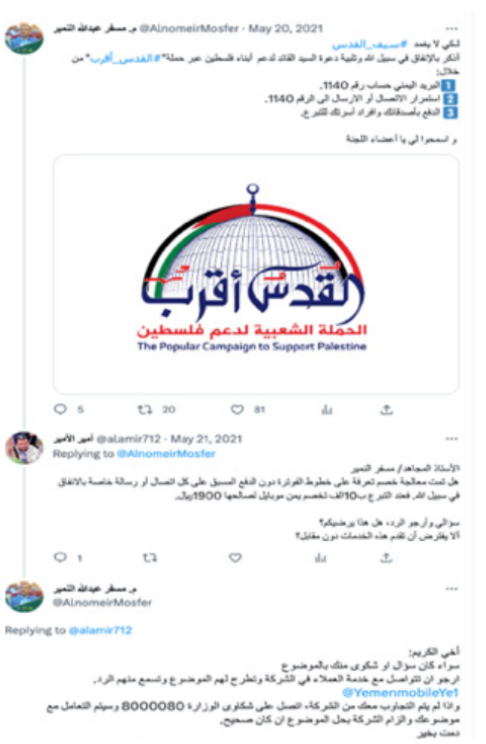
Translation:
Then @alamir72 tweeted in response:
“Mr. Mujahid / Misfer Al-Numeir [Minister of Telecommunication and Information Technology]
Has a tariff been deducted from [phone] lines without prepayment [by the fundraisers] for each call or message to spend in the way of God? When donating 10 thousand [YER], Yemen Mobile deducts [an additional] 1900 YER for itself. My question which [I am asking you to] please answer, is this acceptable to you? Shouldn’t these services [of facilitating donations] be provided free of charge?”
Then @AlnomeirMosfer responded by saying:
“Dear brother:
Whether it is a question or a complaint from you on the matter
Please contact the customer service of the company and raise the issue to them to receive their response. @YemenmobileYe1
If the company does not respond to you, call the Ministry’s complaints [line] at [phone number] 8000080 so your issue will be dealt with and the company will be obligated to solve the issue if correct [to do so].
May you be well”
To understand the mechanics of the fundraiser, it is important to understand how payments to mobile providers function in Yemen. Rather than using a credit card connected to a bank account to subscribe to regular/monthly mobile services, Yemenis purchase cards at local shops which enable them to “load” a specified amount of credit into their account with their MNO. This system enables them to use their cell phone for calls, texts, and internet so long as they can pay for the activity from the funds loaded into their account. After mobile customers called or texted the number provided by the Houthi fundraising ad “for Palestine,” the MNO (in this case Yemen Mobile) was responsible for moving funds into the relevant bank account (presumably account #1140 at Yemen Post) provided the customer had adequate credit.*
Yemen Mobile’s role as a channel for funds destined to terrorist organizations such as Hamas is cause for concern, especially given its status as a company controlled by the Houthi government. But beyond that, Houthi Minister Misfer Abdullah al-Numeir was involved in not only facilitating the transfer of funds through Yemen Mobile (and Yemen Post which will be elaborated upon further) operating under his authority, but the MTIT and its affiliates even donated a total of 300 million YER ($1.2 million) to the campaign.*
Al-Masirah
Al-Masirah promoted the 2021 fundraiser by airing a Houthi advertisement, which depicted the campaign as an opportunity to support Hamas.* As the U.S. Treasury Department noted in 2006 when it designated Hezbollah’s TV and radio stations (al Manar and al Nour, respectively):
Al Manar and al Nour have supported fundraising and recruitment efforts by Hizballah. Al Manar raised funds for Hizballah through advertisements broadcast on the network and an accompanying website that requested donations for the terrorist organization. As recently as late 2005, Hizballah-affiliated charities aired commercials on al Manar, providing contact information and bank account numbers for donations. [emphasis added]*Al-Masirah has engaged in similar activities to al Manar and al Nour in support of a U.S.-designated Foreign Terrorist Organization (FTO).
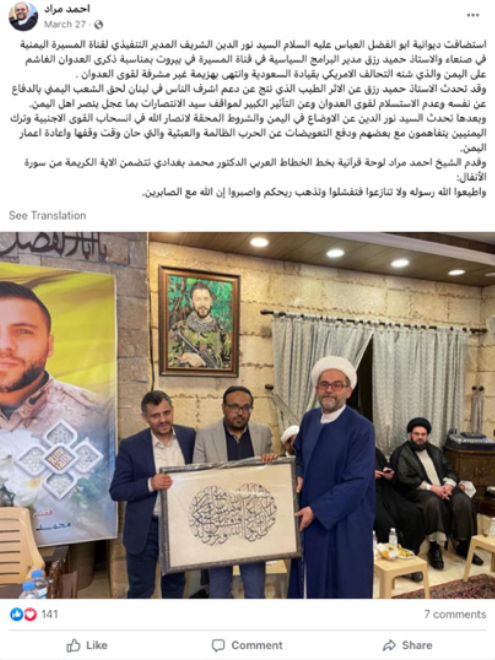
Managing Direct of al-Masirah Noureddine al-Sharif (left) and Director of Political Programs at al-Masirah Hamid Rizq (center) visit Lebanon in March 2023 and meet with Hezbollah officials who presented them with Quranic artwork.
On the organizational level, al-Masirah continues to operate as a mouthpiece for Abdelmalik al-Houthi, the group’s military, spiritual, and political leader in Yemen. The media outlet’s control by Abdelmalik’s most loyal representatives (including Mohammed Abdulsalam who leads the Houthis’ international negotiations)* and its consistently pro-Houthi messaging* have led to its justified recognition as a Houthi platform.*
While Twitter has previously removed al-Masirah from its platform* for violating its rules and policies, new accounts* continue to be created to disseminate Houthi materials produced by al-Masirah. In addition, the al-Masirah app remains readily available in Apple’s App Store.
In the U.K., Almasirah Network Limited was incorporated in 2014 and remains an active company today.* Its list of registered directors include Ammar Al-Hamzy (“Ammar al-Hamzi”), who is the general manager of al-Masirah TV,* as well as his predecessor Ebrahim Mohammed Al-Dailami, who has since resigned and moved on to serve as Houthi ambassador to Iran.
At least three additional companies have registered their address to the same U.K. flat as Almasirah Network Limited.* This includes Arabic Islamic Broadcasting Union Limited,* which lists Nasser Akhdar and Mahboob Nader Golzadeh among its directors. According to a Washington Institute for Near East Policy (WINEP) report, Akhdar (a.k.a. Abu Mustafa) is “the former programming director for Lebanese Hizballah’s al Manar television network” and is currently “in charge of formulating media strategy for Yemen’s Houthi rebels, serving as their main communication link with Hizballah and Iran.”* Golzadeh, like Akhdar, is a member of Iran’s Union des Radios et Télévisions Islamiques (Islamic Radio and Television Union or IRTVU) which is registered in Geneva and has been described by experts as “tasked with disseminating an anti-American and anti-Israeli narrative in the Middle East… functions as an umbrella for ‘axis of resistance’ media outlets throughout the region.”

Members and officers of Iran’s Union des Radios et Télévisions Islamiques (IRTVU) as registered in the government database of corporations in Geneva,Switzerland.*
Hezbollah
2019 Fundraiser for Hezbollah
In 2019,the radio station Sam FM launched a public fundraising campaign to support Hezbollah with the Twitter hashtag #منيمنالإيمان لـ #مقاومة_لبنان(“From Faithful Yemen to the Lebanese Resistance”).* Sam FM, like other media organizations operating in Houthi-controlled territory, is a mouthpiece for Abdelmalik al-Houthi. It was founded in 2014, the year the Houthis took Sanaa, and has a section on its website dedicated to the speeches of Abdelmalik al-Houthi.*
The fundraiser was promoted by Houthi officials and media outlets alike, and it encouraged Yemenis to dnoate by depositing funds in Yemen Post bank acount #555555.The fundraiser was promoted by Houthi officials and media outlets alike, and it encouraged Yemenis to donate by depositing funds in Yemen Post bank account #555555. According to campaign organizers, these funds were collected by Sam FM, turned over to a representative of Abdelmalek al-Houthi, and then provided to Hezbollah Secretary-General Hassan Nasrallah.
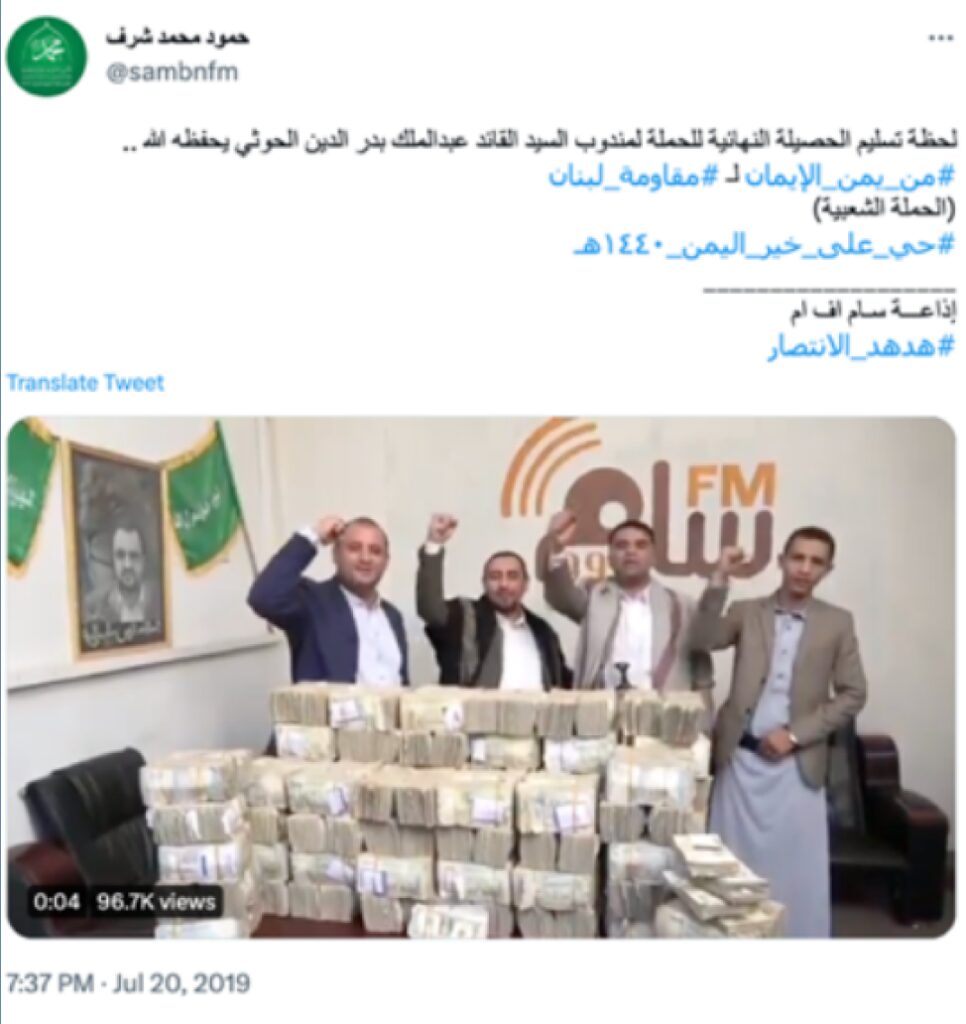
The SAM FM fundraising team standing behind the funds they collected for Hezbollah.*
Translation: “The moment that the final outcome of the campaign was delivered to the representative of Sayyed Commander Abdulmalik Badr al-Din al-Houthi, may God protect him. # From Faithful Yemen to the Lebanese Resistance (grassroots campaign) #Live best Yemen 1440 AH Sam FM radio #encourage victory.”
A coordinated Houthi-Hezbollah media campaign in support of the fundraising effort, with a sign promoting the fundraiser photographed in a shrine for Hezbollah “martyrs.”*
Translation: “From Faithful Yemen to the Lebanese Resistance #Live best Yemen Seventy-three million Yemeni riyals, [raised by] the campaign from the Yemeni people for the Lebanese resistance, Hezbollah Yes, long live the good of Yemen, the people who support the oppressed.”
As is evident from the document published by Hamoud Mohammad Sharaf, who serves as the general manager of Sam FM, the grassroots Yemeni campaign provided the Lebanon-based FTO Hezbollah with hundreds of thousands of dollars (or more than 74 million YER).
Translation: “On Saturday, July 20, 2019 AD, corresponding to [Islamic calendar date] Dhu al-Qidah 17, 1440 AH, and in the presence of management of the grassroots funding campaign #Live Best Yemen, Chairman of the Board of Directors of Sam FM Mr. Ismail Muhammad Al-Mutawakel and GM of Sam FM Radio Hammoud Muhammad Sharaf, the final financial proceeds of the third phase of the [Hezbollah fundraising] campaign for the year 1440 AH, which was launched during the period of May 25 – June 30, were officially handed over to the representative of Sayyed Commander Abdulmalik Badr al-Din al-Houthi – may God protect him – for [the purpose of] supporting, backing and supplying the Islamic Resistance in Lebanon (Hezbollah) under the slogan
From Faithful Yemen to the Lebanese Resistance
Sayyed Commander Abd al-Malik Badr al-Din al-Houthi – may God protect him – will hand over the proceeds of the campaign to His Eminence the Secretary-General of Hezbollah, Mr. Hassan Nasrallah – may God protect him – in the name of the campaign managers and all its participants. And in addition to the financial proceeds, a text message from the campaign management [will be sent] to His Eminence Sayyed Hassan Nasrallah on behalf of the participants and all the free people of Yemen, and Sam FM Radio will publish the text of the message later, God willing.
And SAM FM indicates that the final outcome of the campaign, thank God Almighty, has reached / (74,010,000)
(Seventy-four million and ten thousand YER)
This includes the value of in-kind items donated via the campaign management.
The management of the campaign, along with Board of Directors of Sam FM Radio, expresses their pride and appreciation for the loyal radio audience and gratitude to them and to all Yemeni people who are fighting and spending [their money] in the path of God Almighty.
Sam FM Radio”
Entities Associated with the Houthi Fundraising Campaign for Hezbollah
Sam FM
Sam FM is the radio station that publicized and led the 2019 campaign. Since al Manar and al Nour were sanctioned by the U.S. government for fundraising for Hezbollah, it stands to reason that Sam FM’s creation and then promotion of a fundraiser for Hezbollah should be given similar treatment.
The two individuals leading the effort on behalf of Hezbollah at Sam FM, at least according to the radio station’s own statement presented and translated in this report, are Hamoud Mohammad Sharaf and Ismail Muhammad Al-Mutawakel. Sharaf* is the general manager of Sam FM and previously served as a correspondent for Hezbollah’s al Manar.* Al-Mutawakel is chairman of the board of directors of Sam FM and also serves as the president of the Yemeni Center for Human Rights (YCHR).* YCHR is essentially another Houthi-controlled outlet that promotes the narrative of the brutal regime of Abdelmalik al-Houthi, but it does so under the cynical cover story that it is an NGO advancing human rights.
Ismail Muhammad al-Mutawakel speaking on Sam FM and identified as president of the Yemeni Center for Human Rights.*
Yemen Post (Postal Service Banking System)
Yemen Post* was also used to facilitate banking activity for the fundraiser. Instructions for the campaign, as posted on Twitter as well as the local Yemeni post offices themselves, explicitly encouraged Yemenis to deposit funds into Yemen Post bank account #555555 to support Hezbollah.
Yemen’s Central Post Office had a sign posted to promote donations to Hezbollah via the Yemen Post banking system.*
Translation of the large white poster (center, below the yellow sign for the Central Post Office):“Here is collection point #1 for funds in support of Hezbollah #Live best YemenThe grassroots campaign to support the Islamic Resistance in Lebanon!”
Yemen Post is a governmental body which operates under the auspices of the MTIT and is overseen by Minister Misfer Abdullah al-Numeir, who also serves as chairman of the board of Yemen Post.* In 2021, when al-Numeir stated that the MTIT and its affiliates donated 300 million YER to the “Palestinian people,” Al-Masirah reported that this gesture involved Yemen Post employees “donating” (willingly or otherwise) one month’s salary to the fundraiser.*
It is worth noting that both before and after the fundraiser for Hezbollah, Yemen Post bank account #555555 is cited by Houthi supporters as the account to donate to in order to support the Houthi military industries.* This may indicate that the fundraiser was actually a scheme to have Yemeni citizens foot the bill so that the Houthi Armed Forces could purchase additional weapons/training from Hezbollah.
Conclusions and Recommendations
The Houthi movement and its growing cooperation with Iran and Hezbollah’s “axis of resistance” means that the threat the Houthis pose is no longer confined to Yemen’s Gulf neighbors. The group’s financial support for global terrorist organizations should be of great concern to the international community. The amounts of money raised for and transferred to Hezbollah and Hamas may seem minor in comparison to the groups’ total operating budgets, but this activity highlights a newfound depth of cooperation between Iran’s proxies in the region.
The Houthi movement and its growing cooperation with Iran and Hezbollah’s “axis of resistance” means that the threat the Houthis pose is no longer confined to Yemen’s Gulf neighbors.Officials, organizations, companies, and individuals who provide financial support for designated terrorist organizations should be sanctionable under existing U.S. regulation EO 13224.* This report sought to identify those parties to the terror fundraisers that were likely aware of their role in financing Hamas or Hezbollah. Promulgating new sanctions against Houthi leaders demonstrates that their support for terrorism will not be tolerated, and further designations against entities are needed to help isolate Houthi-backed companies from benefiting from open international commerce.
Of course, sanctions may not diminish Houthi determination to fund terrorist groups or cooperate with them, but sanctions should financially hamstring the Sanaa-based corporations mentioned in this report. That would, in practice, make these companies far less useful as facilitators of or donors to future terrorist financing schemes.
 Eurasia Press & News
Eurasia Press & News


